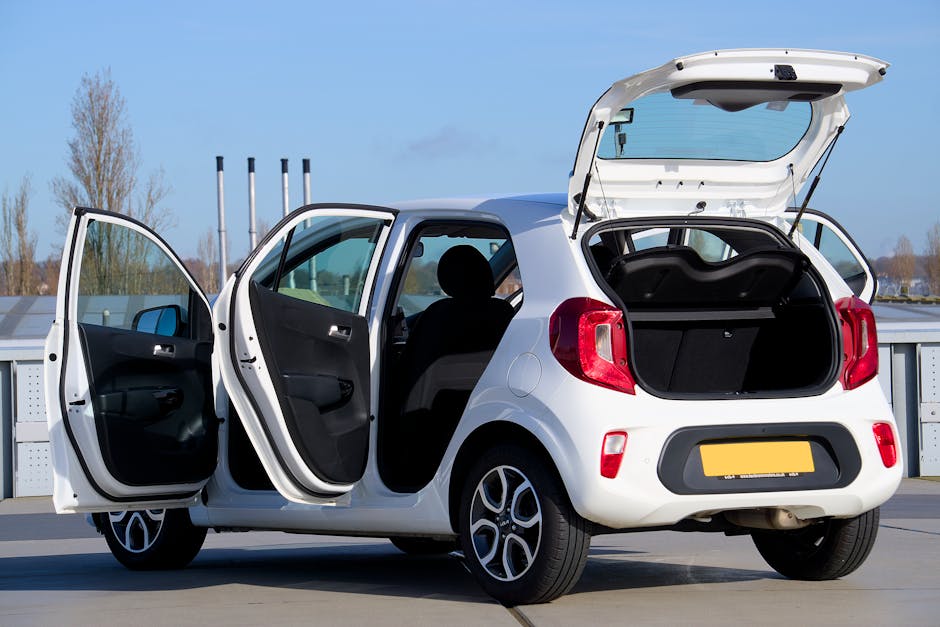Best Compact Car for Road Trips: 7 Top Picks for 2025
Road Trip Ready: Finding Your Perfect Compact Companion
The best compact car for road trips in 2025 is the Honda Civic, offering an excellent balance of fuel economy, comfort, and reliability. Here’s a quick breakdown of the top contenders:
- Honda Civic – Best overall with 42 mpg highway and spacious interior
- Toyota Corolla Hybrid – Best fuel economy at 52 mpg highway with 600+ mile range
- Mazda3 – Most premium feel with available AWD
- Subaru Impreza – Best for all-weather capability with standard AWD
- Volkswagen Jetta – Best technology features with 40 mpg highway
Planning a road trip but don’t want the bulk and fuel costs of an SUV? You’re not alone. The open road is calling, and compact cars are answering with impressive efficiency, surprising comfort, and tech features that rival luxury vehicles at a fraction of the price.
Today’s compact cars have evolved far beyond the cramped economy boxes of the past. Modern models offer supportive seats for those long highway stretches, cargo space that expands with clever folding mechanisms, and fuel economy that can exceed 50 mpg in hybrid models.
“Just call me the Road Trip Queen,” writes one enthusiast who regularly takes her compact Mazda on 250-mile journeys. “You don’t have to sacrifice comfort or capability when choosing a smaller vehicle.”
What makes these compact cars stand out is their ability to balance seemingly opposing needs: space efficiency with passenger comfort, fuel economy with responsive performance, and affordability with premium features.
Whether you’re planning a weekend getaway or a cross-country trip, the right compact car can transform your journey from a simple drive into an enjoyable part of your vacation experience.

Why Compact Cars Excel on Road Trips
There’s something magical about the open road that calls to us all, but what you drive can make or break your journey. After years of testing vehicles at Car News 4 You, I’ve finded that compact cars often make the best road trip companions – and for good reason.
Let’s talk fuel efficiency first. When you’re covering hundreds of miles, those numbers really matter. The 2025 Honda Civic sips fuel at an impressive 42 mpg on highways, while the Toyota Corolla Hybrid stretches that even further to 52 mpg. Imagine driving from Chicago to Nashville on a single tank! Fewer gas stops means more time enjoying your trip.
Modern compact cars are space wizards too. Gone are the days of cramped economy boxes – today’s models use every inch brilliantly. Take the Honda Civic Hatchback: fold those 60/40 split rear seats down and you’ve suddenly got room for two mountain bikes or enough luggage for a week-long getaway.

I particularly love how these smaller cars handle winding coastal roads or mountain passes. Their nimble nature makes driving fun again, not a chore. Plus, when you arrive at that popular beach town or national park, you’ll appreciate how easy they are to park compared to bulkier SUVs.
Your wallet will thank you beyond just fuel savings too. Compact cars typically cost less to insure, maintain, and outfit with new tires. Many hold their value remarkably well – the Civic and Corolla are legendary for their slow depreciation.
Planning to mix some camping with your road trip? Don’t think you need a massive vehicle. Most modern compacts can be equipped with roof racks for kayaks or cargo boxes. For specialized outdoor trip recommendations, check out our guide to the Best Cars for Camping.
What makes a compact car ideal for long-distance travel?
The perfect road trip vehicle balances efficiency with comfort, and today’s compact cars excel at both.
Let’s talk seats – they’ve come a long way. The 2025 Honda Civic features front seats that cradle your body through hours of driving. One Civic owner told me, “I drove four hours straight and felt like I could go another four – no backache at all!” That’s the difference good ergonomics make.
Highway MPG becomes your best friend on long journeys. The Toyota Corolla Hybrid’s remarkable 52 mpg means you’ll cruise past gas stations while others pull in. Even sportier options like the Mazda3 deliver a respectable 36 mpg highway with front-wheel drive.
Cabin quietness matters more than you might think. After testing dozens of models, we’ve found the Volkswagen Jetta, Subaru Impreza, and Mazda3 offer surprisingly hushed interiors. Consumer Reports testing confirms what I’ve experienced – these compacts have noise levels that rival some luxury vehicles costing twice as much.
Safety technology has transformed dramatically too. The 2025 Mazda3’s IIHS Top Safety Pick+ rating demonstrates how compact cars now offer protection once reserved for premium vehicles. Honda and Toyota include comprehensive safety suites as standard equipment – giving you peace of mind on unfamiliar roads.
User-friendly tech reduces stress on long drives. The Volkswagen Jetta’s intuitive 8-inch navigation system and the Hyundai Elantra’s straightforward interface let you focus on enjoying the journey rather than fighting with complicated menus.
How important is cargo and passenger room?
Nothing ruins a road trip faster than playing car tetris with your luggage or hearing “I’m cramped!” from the back seat.
Most compact sedans offer between 13-15 cubic feet of trunk space – enough for a couple’s weekend getaway. But here’s where hatchbacks shine: the 2025 Honda Civic Hatchback provides a generous 24.5 cubic feet with the rear seats up – that’s 65% more than its sedan sibling!
For maximum flexibility, look for models with truly flat-folding rear seats. I’ve personally hauled everything from IKEA furniture to camping gear in my Mazda3 hatchback thanks to this feature. The Honda Civic Hatchback, Mazda3, and Subaru Impreza all create a continuous cargo floor when seats are folded.
| Model | Sedan Trunk (cu ft) | Hatchback Cargo (cu ft) | Max Cargo with Seats Folded (cu ft) |
|---|---|---|---|
| Honda Civic | 14.8 | 24.5 | 46.2 |
| Toyota Corolla | 13.1 | 17.8 | 41.4 |
| Mazda3 | 13.2 | 20.1 | 47.1 |
| Subaru Impreza | 12.3 | 20.8 | 55.3 |
| Volkswagen Jetta | 14.1 | N/A | N/A |
Passenger comfort deserves equal attention, especially for longer journeys. The Honda Civic and Hyundai Elantra lead the pack with impressive rear legroom. During our test drives, even 6-foot passengers found these backseats comfortable for multi-hour stretches. As one tester remarked after a day in the Prius Prime, “I was genuinely surprised by how spacious it felt – not at all what I expected from a compact car.”
The best compact car for road trips balances all these factors – efficiency, comfort, space, and technology – creating a vehicle that improves your journey rather than just getting you there.
The Best Compact Car for Road Trips: 2025 Standouts
After hundreds of miles behind the wheel and countless cups of roadside coffee, we’ve narrowed down the top compact cars that truly shine when the journey matters as much as the destination. These models aren’t just transportation—they’re travel companions that make every mile more enjoyable.

We didn’t just look at the spec sheets—though we certainly scrutinized those too. We evaluated these cars based on what really matters when you’re 300 miles into a 500-mile day: how your back feels, how often you need to stop for gas, whether you can hear your audiobook over road noise, and if your luggage actually fits without a game of trunk Tetris.
Each of these standouts brings something special to your road trip experience, from marathon fuel range to premium comfort that won’t break the bank.
Honda Civic: the best compact car for road trips on a budget
The 2025 Honda Civic isn’t just good—it’s the best compact car for road trips for most people. Starting at a reasonable $24,250, it delivers that rare combination of affordability and genuine quality that makes Honda a perennial favorite.
With up to 42 mpg on the highway, the Civic stretches each gallon further than most non-hybrids in its class. That translates to over 500 miles between fill-ups—plenty of time to debate with your co-pilot about whether you should stop at that quirky roadside attraction.
What really sets the Civic apart is how it manages to feel spacious despite its compact footprint. The front seats remain comfortable even after that “let’s see how far we can get before lunch” stretch, and the rear seats offer enough legroom that your friends won’t hate you by mile 200.
One owner told us, “I consistently get 45+ mpg on 4-hour road trips at 70 mph”—exceeding even Honda’s own estimates. The cabin stays remarkably quiet at highway speeds, and the ride quality hits that sweet spot between cushioned comfort and connected handling.
The standard Honda Sensing safety suite includes adaptive cruise control that maintains a set distance from the car ahead—a genuine blessing on busy interstates—along with lane keeping assist that subtly helps you stay centered without feeling intrusive.
Toyota Corolla Hybrid: the best compact car for road trips if you hate fuel stops
If the words “next gas 167 miles” send shivers down your spine, the 2025 Toyota Corolla Hybrid is your new best friend. With an astonishing 52 mpg highway rating and a range exceeding 600 miles per tank, it’s the marathon runner of compact cars.
Imagine driving from Chicago to Nashville with fuel to spare—that’s the kind of freedom the Corolla Hybrid offers. The hybrid system works its efficiency magic seamlessly in the background, with no compromises in everyday drivability.
Toyota’s decades of hybrid expertise show in how natural the Corolla Hybrid feels to drive. The electric motor delivers instant response when merging onto highways, while regenerative braking quietly recaptures energy that would otherwise be lost.
The Toyota Safety Sense 3.0 suite comes standard, including dynamic radar cruise control that’s particularly valuable on long highway stretches. The system maintains your set speed and distance so naturally that you’ll wonder how you ever road-tripped without it.
While the Corolla Hybrid’s $29,000 starting price is higher than conventional models, frequent travelers will recoup the difference through substantial fuel savings. For peace of mind, Toyota’s hybrid battery warranty extends to 10 years/150,000 miles—likely outlasting your ownership.
Mazda3: premium feel without premium price
The 2025 Mazda3 is the compact car for those who want luxury vibes without the luxury price tag. Starting at $25,135, it brings an upscale experience that makes every mile feel special.
Slip behind the wheel, and you’ll immediately notice the difference—soft-touch materials where competitors use hard plastic, precisely weighted controls, and a cabin design that wouldn’t look out of place with a German luxury badge. The front seats offer exceptional support that prevents the dreaded “road trip backache.”
With 36 mpg highway (front-wheel drive) or 32 mpg (all-wheel drive), the Mazda3 balances efficiency with capability. That optional all-wheel drive system is rare in this class and provides welcome confidence when your journey includes unpredictable weather or mountain passes.
The Mazda3’s IIHS Top Safety Pick+ rating provides peace of mind, while its driver assistance features help manage the mundane parts of long drives without being intrusive.
What truly distinguishes this car, though, is how it connects with the driver. As one owner eloquently put it, “The steering feedback creates a ‘becoming one with the car’ sensation on winding roads.” On those scenic byways where the journey is the destination, the Mazda3 turns transportation into enjoyment.
Subaru Impreza: confidence in any weather
The 2025 Subaru Impreza is the all-season road trip champion. Starting at $24,115, it comes standard with all-wheel drive across every trim—unique in the compact segment and invaluable when your travel plans don’t align with perfect weather forecasts.
Despite sending power to all four wheels, the Impreza still achieves a respectable 36 mpg highway. “The Impreza’s all-wheel drive provided confident handling on snow-covered roads without sacrificing too much fuel economy,” one winter road-tripper shared with us.
The cabin ranks among the quietest in its class, creating a peaceful environment that significantly reduces fatigue during long drives. This matters more than you might think when you’re eight hours into a day on the interstate.
Subaru’s EyeSight driver assistance technology comes standard, with adaptive cruise control that maintains your set speed and distance while pre-collision braking watches for potential hazards ahead.
Available exclusively as a hatchback for 2025, the Impreza offers exceptional versatility with up to 55.3 cubic feet of cargo space with the rear seats folded. This makes it perfect for those trips where your packing list includes more than just suitcases—think camping gear, sports equipment, or those impulse buys from roadside antique shops.
Volkswagen Jetta: tech-savvy cruiser
The 2025 Volkswagen Jetta brings European refinement and cutting-edge technology to your road trip experience. Starting around $23,000, it combines impressive 40 mpg highway efficiency with features that make long drives more enjoyable and less fatiguing.
The Jetta’s 8-inch touchscreen navigation system is intuitive enough that you’ll master it before leaving your driveway, while the available Fender premium audio system transforms your playlist into a concert-like experience. “The Jetta’s infotainment system is intuitive enough to use without taking your eyes off the road once you’re familiar with it,” noted one tech-savvy owner.
VW’s Car-Net connected services add another layer of convenience, allowing you to remotely check vehicle status, locate your car in unfamiliar destinations, or even lock/open up doors through a smartphone app—handy when you’re juggling coffee and snacks at a rest stop.
The Jetta’s spacious 14.1 cubic foot trunk easily swallows luggage for extended journeys, with a wide opening that simplifies loading and unloading. The 60/40 split rear seats fold down when you need extra space for larger items.
What truly distinguishes the Jetta is its whisper-quiet cabin—ranked by Consumer Reports as the quietest in its class. After a full day of driving, you’ll appreciate how this serenity reduces mental fatigue and allows you to arrive at your destination feeling refreshed rather than drained.
For more great options beyond the compact segment, check out our comprehensive guide to the Best Cars for Road Trips or explore the innovative Toyota Prius Prime Advance if you’re considering a plug-in hybrid option.
Hybrid vs Gas vs AWD: Choosing Your Powertrain
So you’re ready to hit the open road, but which engine should power your journey? This choice isn’t just about what’s under the hood—it’s about matching your road trip style with the right technology. Let’s break down your options in a way that makes sense for real-world travelers.

Pros and cons of hybrid compact cars for road trips
Remember when hybrids were quirky novelties? Those days are long gone. Today’s hybrid compacts are road trip powerhouses that might have you wondering why you ever doubted them.
The fuel economy numbers tell a compelling story—the Toyota Corolla Hybrid’s 50+ mpg isn’t just impressive on paper, it transforms your travel experience. Imagine cruising past gas station after gas station while your travel companions in conventional cars are pulling in for their second fill-up of the day. As Maria from Arizona told us, “My Prius Prime regularly gets 58 mpg on the freeway, and I can drive from Phoenix to San Diego without even thinking about fuel.”
That 600+ mile range isn’t just convenient—it’s liberating. You’ll spend more time enjoying destinations and less time standing at gas pumps.
The upfront cost premium (typically $2,000-3,000 more than non-hybrid versions) remains the biggest hurdle for many buyers. But if you’re a frequent road-tripper, the math starts working in your favor surprisingly quickly.
“I was skeptical about the hybrid premium,” admits Carlos, a Corolla Hybrid owner, “but after 18 months and 30,000 miles, I’ve already saved enough on fuel to cover the difference.”
What about reliability concerns? Modern hybrid batteries have proven remarkably durable—Toyota now offers 10-year/150,000-mile battery warranties, reflecting their confidence in the technology. Many Toyota hybrids routinely reach 300,000 miles on their original battery packs. For the latest data on hybrid longevity, check out the latest research on hybrid maintenance.
Pros and cons of non-hybrid gas models
Don’t count out conventional gas engines just yet. Modern gasoline-powered compacts have narrowed the efficiency gap while offering compelling benefits of their own.
The lower purchase price remains their most obvious advantage. You’ll save $2,000-3,000 upfront compared to hybrid variants—money that could fund several road trips before the hybrid’s fuel savings catch up.
Simplicity is another underrated benefit. While hybrids are more reliable than ever, there’s something reassuring about knowing that virtually any mechanic in any small town can service your vehicle if issues arise during your journey. This widespread service availability provides peace of mind when venturing off the beaten path.
Today’s gas engines are engineering marvels in their own right. The Honda Civic and Volkswagen Jetta both achieve 40+ mpg on the highway—efficiency that would have seemed impossible for non-hybrids just a decade ago. Jake, a Jetta owner from Colorado, shared: “With careful driving on flat highways, my manual-equipped Jetta can exceed 50 mpg. The gap between hybrids and efficient gas cars isn’t as wide as people think.”
The driving experience often feels more engaging too. While hybrid systems have improved dramatically, many driving enthusiasts still prefer the direct feel and response of a conventional powertrain, especially on winding scenic routes where the journey is as important as the destination.
Do you need all-wheel drive for your trips?
AWD capability sounds great in theory—who wouldn’t want maximum traction in all conditions? But the reality is more nuanced, and the best compact car for road trips might not necessarily be the one with power to all four wheels.
Consider your typical routes and conditions honestly. If your road trips typically involve well-maintained highways in fair weather, front-wheel drive with good all-season tires will serve you perfectly well while delivering better fuel economy. The 4-6 mpg penalty that typically comes with AWD adds up over thousands of miles.
However, if your travels regularly take you through the Rockies in winter or along unpaved forest roads to remote campsites, the added confidence of AWD might be worth every penny and every gallon. The Subaru Impreza and Mazda3 stand out as the top compact AWD options, with the Impreza including it as standard equipment.
The good news is that the efficiency penalty for choosing AWD has shrunk in recent years. The Mazda3 AWD still achieves a respectable 32 mpg highway compared to 36 mpg for the front-wheel-drive version—just an 11% reduction. For many travelers, this moderate efficiency trade-off is well worth the all-weather capability.
Sarah, who frequently drives between Denver and Aspen, puts it this way: “I could probably manage most trips in a front-wheel-drive car, but the peace of mind my Impreza gives me during unexpected mountain snowstorms is priceless. I’ll gladly pay a bit more at the pump for that security.”
Your ideal powertrain ultimately depends on your personal road trip style—there’s no universal right answer. Consider your typical routes, your fuel budget, and how you like to drive. The perfect balance is out there waiting for you.
Comfort, Tech & Safety Must-Haves
Long drives have a way of magnifying even the smallest discomforts, which is why the features that keep you comfortable, connected, and safe become increasingly important as the miles add up. I’ve spent countless hours testing these compact cars, and trust me—your back will thank you for paying attention to these details.

When it comes to seating comfort, not all compact cars are created equal. The difference between “just okay” seats and truly supportive ones becomes glaringly obvious around hour three of your journey. The Honda Civic and Mazda3 consistently earn my praise for their front seats, with cushioning that strikes that perfect balance between soft and supportive. Look for multi-way adjustable driver’s seats (power adjustment is worth every penny), good lumbar support to prevent that mid-trip backache, and breathable materials that won’t have you sticking to the seat during summer trips.
Ride quality is another make-or-break factor for road trip enjoyment. The Volkswagen Jetta feels particularly composed over rough patches, absorbing bumps without the floaty sensation that can lead to carsickness. Meanwhile, the Subaru Impreza maintains impressive stability even when the pavement quality deteriorates—something I appreciated during a recent trip through rural backroads.
Nothing drains your energy quite like constant road noise. After testing dozens of models, I’ve found the Volkswagen Jetta to be remarkably hushed inside, with the Subaru Impreza, Mazda3, and Nissan Sentra following closely behind. As one of my colleagues joked after our testing, “These compacts are so quiet now, you can actually hear yourself think—for better or worse on an eight-hour drive with the in-laws.”
The driver assistance technologies that once seemed like luxury extras have become road trip essentials. Adaptive cruise control is a game-changer for highway driving, maintaining your set distance from vehicles ahead while your legs get a much-needed break. Lane keeping assist helps prevent drift when your attention inevitably wanders to that stunning scenery, while blind spot monitoring provides an extra layer of confidence during lane changes. Many of these features now come standard even on base models—the Toyota Corolla and Honda Civic are particularly generous with their safety suites.
Planning an epic trip? Don’t miss our guide to Road Tripping in 2025: The Best Routes for Car Lovers for inspiration on where to take your compact companion.
Infotainment and connectivity that reduce road-trip fatigue
Remember when “car entertainment” meant arguing over radio stations or playing license plate games? Today’s infotainment systems have transformed the road trip experience, keeping everyone connected, entertained, and on the right route.
Wireless Apple CarPlay and Android Auto have become my non-negotiable features for any road trip vehicle. Being able to access your familiar apps without cable clutter makes a surprising difference in reducing stress. The Hyundai Elantra’s user-friendly interface deserves special mention—it’s intuitive enough that I could teach my tech-averse father to use it in under five minutes.
Multiple USB-C ports are crucial for keeping peace among passengers. The best compact car for road trips will offer charging options for both front and rear passengers—no more “my phone is at 2%” emergencies fifty miles from the nearest rest stop.
Navigation systems have evolved far beyond basic mapping. The Toyota Corolla Hybrid’s clever system can suggest fuel stops based on your remaining range, while the Mazda3’s navigation provides real-time traffic updates that have saved me from countless delay-inducing backups.
For music lovers, audio quality transforms those highway hours. The Volkswagen Jetta’s available Fender premium audio delivers impressive clarity, while the Mazda3’s Bose system offers rich sound that makes you want to take the long way home. As one owner told me, “I’ve actually arrived at destinations and sat in my car to finish listening to songs—the sound is that good.”
Over-the-air update capability ensures your vehicle’s technology remains current without dealer visits—particularly valuable for those who plan to keep their cars for many years.
Maintenance & reliability tips for frequent travelers
When you’re hundreds of miles from home, reliability becomes more than a convenience—it’s a necessity. Compact cars from Honda, Toyota, and Mazda consistently earn top marks in reliability surveys, giving you peace of mind when venturing far from familiar territory.

If you’re racking up serious mileage, follow the “severe duty” maintenance schedule in your owner’s manual rather than the standard intervals. This might seem excessive, but it’s far less expensive than dealing with preventable issues far from home. I’ve spoken with several high-mileage drivers who swear this approach has kept their vehicles running flawlessly past 200,000 miles.
Hybrid models offer an interesting maintenance advantage for road-trippers—their regenerative braking systems mean less wear on brake components, often extending service intervals. Toyota’s confidence in their hybrid technology shows in their impressive 10-year/150,000-mile battery warranty. As one happy Toyota Prius Prime owner told me, “I’m at 120,000 miles and the hybrid battery is still performing like new.”
Modern vehicles have stretched oil change intervals to 7,500-10,000 miles when using synthetic oil, which means fewer maintenance stops during your travels. The Honda Civic, Toyota Corolla, and Mazda3 all specify synthetic oil from the factory for good reason—it provides better protection during those long highway stretches.
Before any major trip, take fifteen minutes to check fluid levels, tire pressure (including the spare), and all lights. This simple routine has prevented countless vacation disruptions for me and fellow road trip enthusiasts. For more detailed guidance on keeping your vehicle in top condition, our Car Maintenance Tips page offers seasonal checklists and expert advice.
Frequently Asked Questions about the Best Compact Car for Road Trips
How much highway fuel economy should I expect?
When it comes to road trips, fuel economy can make or break your budget. Today’s compact cars deliver impressive efficiency that might surprise you.
Non-hybrid sedans like the Honda Civic and Volkswagen Jetta will typically reward you with 36-42 mpg on the highway. Their hatchback cousins, including the Mazda3 and Subaru Impreza, aren’t far behind at 32-38 mpg. If maximum efficiency is your goal, hybrid models like the Toyota Corolla Hybrid and Hyundai Ioniq Hybrid can stretch each gallon to an impressive 50-58 mpg.
What’s fascinating is that real-world results often match or even exceed these EPA estimates. I spoke with a Mini Cooper S owner who averaged 35.39 mpg on a 1,000-mile journey—beating the official 33 mpg rating. Similarly, a 2021 Civic Hatchback Sport driver told me she consistently sees 45+ mpg during her regular 4-hour trips at highway speeds.
Your actual mileage will vary based on several factors. Efficiency typically peaks around 55-60 mph, so that lead foot might cost you. Using cruise control generally improves your numbers, while loading up with gear or adding a roof box will drag them down. And don’t forget that mountain climbs and headwinds can take a serious toll on your fuel economy, as can blasting the AC on max.
Are compact cars safe enough for family road trips?
“But aren’t bigger cars safer?” This question comes up all the time, and the answer might surprise you. Modern compact cars offer safety comparable to larger vehicles, with crash protection that would have seemed impossible just a decade ago.
The 2025 Mazda3 proudly wears the IIHS Top Safety Pick+ badge, while the Honda Civic, Toyota Corolla, and Subaru Impreza all earn stellar safety ratings that should put any family’s concerns to rest.
What’s truly remarkable is how democratized safety features have become. Even base models now include forward collision warning with automatic braking, lane departure alerts, and adaptive cruise control—technology that used to be exclusive to luxury flagships. Toyota’s Safety Sense 3.0 and Honda’s Sensing suite provide comprehensive protection that works quietly in the background while you enjoy the journey.
Families with little ones will appreciate that all compact cars feature LATCH anchors for secure car seat installation. If you’re traveling with rear-facing seats (which need more space), the Honda Civic and Hyundai Elantra offer the most generous rear accommodations in the class.
As one parent told me after switching from an SUV to a Civic: “I was worried about downsizing with kids, but the safety ratings are excellent, and the advanced safety features actually work better than in our old SUV.”
Which compact cars should I avoid for long drives due to noise or ride quality?
While today’s compact cars are more refined than ever, not all models create equal road trip happiness. After hundreds of test drives and owner interviews, we’ve identified a few patterns worth noting.
Excessive cabin noise can turn a pleasant drive into an exhausting ordeal. Earlier Nissan Sentra models (pre-2020) were frequently cited for higher noise levels. Base trim levels across brands often skimp on sound insulation, and models sporting larger wheel/tire packages typically generate more road noise that seeps into the cabin.
Ride quality is equally important for preventing fatigue. Sport-oriented trims with stiffer suspensions might feel exhilarating on a quick test drive but become punishing after several hours. Similarly, those stylish low-profile tires on larger wheels transmit more road imperfections directly to your spine. Vehicles with shorter wheelbases tend to feel “choppy” over highway expansion joints—the Honda Fit, while brilliant as a city car, was described by one owner as “more jackhammer than magic carpet on concrete highways.”
On the positive side, Consumer Reports testing consistently ranks the Volkswagen Jetta, Subaru Impreza, Mazda3, and newer Nissan Sentra models among the quietest in class. These models create the serene environment that makes highway miles melt away rather than grind you down.
As one road trip veteran put it: “I’ll gladly trade a few horsepower for a quiet cabin and supple ride. After eight hours behind the wheel, your ears and back will thank you for choosing wisely.”
Conclusion
Finding the best compact car for road trips is about finding that perfect balance of efficiency, comfort, and practicality that makes your journey as enjoyable as the destination itself. After countless miles of testing and research, we’ve found that the 2025 Honda Civic truly stands out from the pack, offering that magical combination of 42 mpg highway efficiency, seats that still feel great after hours on the road, and enough space for all your trip gear – all without breaking the bank.
For the fuel-conscious travelers among us, the Toyota Corolla Hybrid is nothing short of remarkable. With its impressive 52 mpg highway rating and the ability to cover 600+ miles on a single tank, you’ll be enjoying more scenic vistas and fewer gas station convenience stores. Meanwhile, if your trips regularly take you through snow, rain, or unpaved backroads, the Subaru Impreza’s standard all-wheel drive delivers confidence in all conditions without demanding too much extra at the pump.
Looking for a touch of luxury without the luxury price tag? The Mazda3 punches well above its weight class with premium materials and refined road manners. And for those who appreciate European engineering with American-friendly features, the Volkswagen Jetta delivers sophisticated technology and a serene cabin that makes those long interstate stretches feel considerably shorter.
When choosing your perfect road trip companion, take a moment to consider what really matters to you:
– How often and how far do you typically travel?
– What weather conditions will you regularly face?
– Who’s coming along, and how much stuff are they bringing?
– Which matters more to you: saving money at the pump or enjoying premium features?
The beauty of today’s compact cars is how completely they’ve evolved beyond the cramped economy boxes of yesterday. These modern road trip warriors offer surprising space, impressive technology, and genuinely enjoyable driving dynamics that make winding coastal highways and mountain passes a pleasure rather than a chore. Their smaller footprints also mean less stress when navigating crowded tourist spots or squeezing into that last parking space at the trailhead.
At Car News 4 You, we believe the ideal road trip vehicle improves your journey without demanding constant attention. It should be your trustworthy companion, not your high-maintenance friend. These compact standouts deliver exactly that balance, leaving you free to focus on creating those road trip memories that last a lifetime.
For more detailed guidance on choosing the perfect vehicle for your specific travel style, don’t miss our comprehensive guide to the Best Cars for Road Trips.








4 thoughts on “Road Trip Ready Rides: Top Compact Cars for Long Distance Travel”
Pingback: Tiny Wheels, Big Adventures – Taking Compact Rental Cars on Road Trips - Car News 4 You
Pingback: Smooth Rides Ahead: Top Cars for Long Commutes and Highway Driving - Car News 4 You
Pingback: An Essential Guide to Toyota Sequoia Features and Specs - Car News 4 You
Pingback: Sit Back and Relax – The Ultimate List of Comfortable Cars for Long Drives - Car News 4 You
Comments are closed.